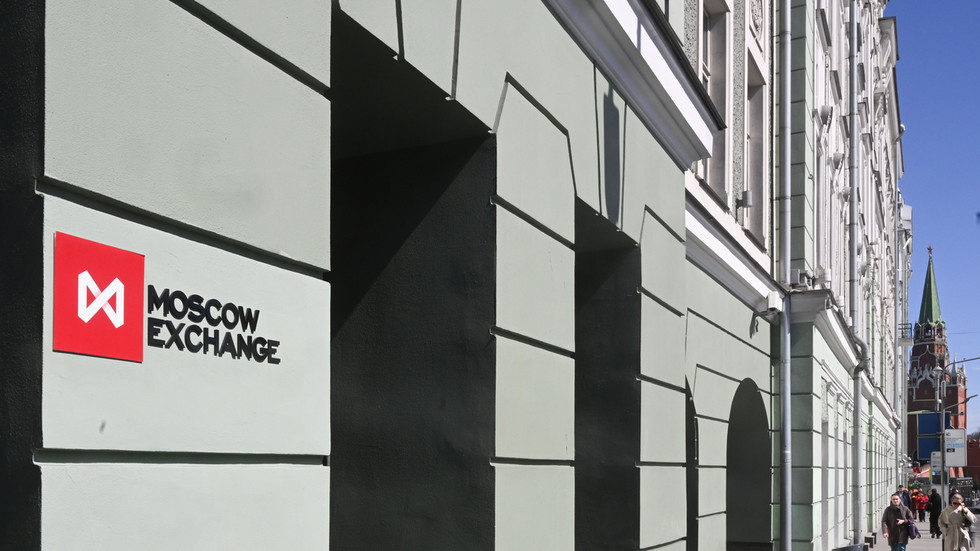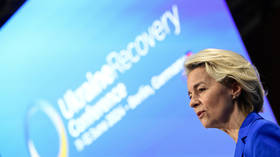
Washington has unveiled a new set of restrictions, targeting Russia’s financial sector and currency market

The office of the Moscow Stock Exchange in 2022. © Sergey Guneyev / Sputnik
The US government announced a new wave of sanctions against Russia on Tuesday, targeting its energy, metals and mining industries, as well as some of the nation’s major lenders and the Moscow Stock Exchange. The latest round of restrictions appears to be one of the biggest ones since the start of the armed conflict in Ukraine in February 2022.
According to the US Department of the Treasury, the measures will impact more than $100 million in trade between Russia and its foreign partners and affect companies and individuals in China, Kyrgyzstan, Türkiye and other nations of Central Asia, the Middle East, and the Caribbean. RT breaks down the immediate effects and potential consequences, as well as Moscow’s reaction to the latest round sanctions.
Moscow Exchange in the Crosshairs
Washington blacklisted some 300 additional individuals and entities in Russia and beyond, accusing them of having links to Moscow’s “war economy.” The measures were focused on Russia’s ability to procure the necessary materials and “critical supplies” from third countries, Treasury Secretary Janet Yellen said.
American citizens were prohibited from providing IT services to anyone in Russia. The US Treasury added two major Russian banks – Sberbank and VTB – to the blacklist, which makes other financial institutions dealing with them potential targets for secondary sanctions. On top of that, the National Clearing Center and the National Settlement Depository of the Moscow Stock Exchange (MOEX) were also blacklisted.


Read more
USD & Euro trading stopped
The Moscow Stock Exchange announced the suspension of trade in US dollars and euros on Wednesday. The suspension affects foreign and precious metals trade, as well as stock and money trading on Russia’s largest public markets, MOEX said in a statement. The order is due to take effect on Thursday.
In the meantime, all other financial instruments remain operational, MOEX said.
Russia’s top banks respond
Russia’s Central Bank said in a statement on Wednesday that trading in dollars and euros will continue “on the over-the-counter market.” Individuals and companies will be able to purchase and sell both currencies at the Russian banks. All the bank deposits made in dollars and euros will remain secure, the financial regulator stated.
The Bank of Russia said it will use “bank records and information from digital over-the-counter trading platforms” to establish exchange rates for dollars and euros in the future.
Sberbank and VTB stated that the new restrictions would not impact their day-to-day operations in Russia and abroad. Both lenders confirmed that operations with currency continue to be available at their offices.


Read more
What about the ruble?
The new restrictions will likely strengthen the Russian currency, several financial analysts told RBK business news outlet on Wednesday. The growing uncertainty will reduce speculative trade and lead to a more favorable ruble-to-dollar exchange rate, they said. “There is nothing at the moment that could definitively point towards the weakening of the ruble,” Sofya Donets, a lead economist at T-Investitsii, told the publication.
Alex Isakov, an economist at Bloomberg, told the BBC that he expects “a structural increase of the ruble’s volatility” and a weaker ruble in the future. However, a deficit of foreign currency in Russia is unlikely, he said. “The main effect will not be a currency deficit, but rather that exporters and importers will see a rise in the operational expenses from their transactions, such as the cost of operations with currency, money transfers, and so on,” Isakov said.
Moscow vows to retaliate
Russia “will not leave the aggressive actions of the US unanswered,” Foreign Ministry’s spokeswoman Maria Zakharova said in a statement, without elaborating.
Some members of the State Duma suggested that additional foreign restrictions could incentivize making Russia’s economy more resilient and competitive. “We are actively developing domestic industries and innovations, which contribute to the modernization of our economy,” MP Dmitry Belik told Ria Novosti on Wednesday. He argued that Russia has developed “an immunity” to sanctions over the years.
State Duma Speaker Vyacheslav Volodin also argued that Moscow has learned to counter Western sanctions. “Despite the statement from Washington and Brussels, saying that they will tear apart the Russian economy, the country is [successfully] developing,” he wrote on Telegram, noting that Russia’s GDP grew by 3.6% in 2023 and has increased by 5.4% since the beginning of 2024.
The State Duma’s deputy speaker, economist Mikhail Delyagin, told news website Lenta.ru that the Moscow Exchange’s regulations could be revised in order to tackle the sanctions. “The trade can also be moved to a different platform,” he said.